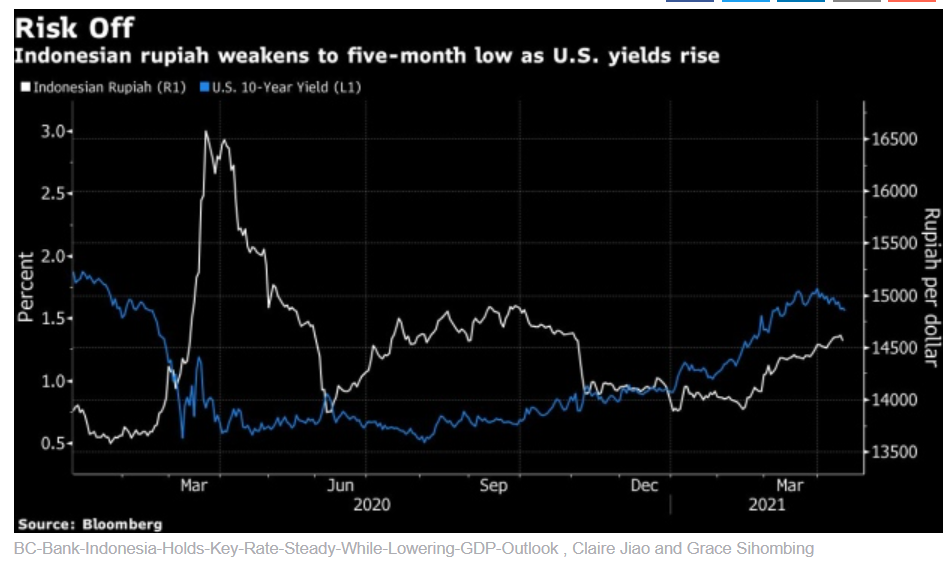Bank Indonesia Holds Key Rate Steady While Lowering GDP Outlook
(Bloomberg) — Indonesia’s central bank left its benchmark interest rate unchanged, and cut its outlook for economic growth, as it seeks to support an uneven recovery as foreign outflows pressure the country’s currency.
Bank Indonesia kept the seven-day reverse repurchase rate at a record low of 3.5% on Tuesday, as expected by all 35 economists surveyed by Bloomberg. The central bank said it now expects gross domestic product to expand 4.1%-5.1% this year, down from 4.3%-5.3% previously.
While the decision to stand pat was widely expected, “it has been adopted with currency stability in mind, in the midst of the still-unsettled global yield environment,” said Wellian Wiranto, an economist at Oversea-Chinese Banking Corp. in Singapore. “The hold has come despite the fact that, arguably, the need to support growth has gone up.”
As recovery takes hold in advanced economies, investors have fled emerging markets like Indonesia, sapping demand for the country’s assets. The rupiah is one of Asia’s worst performing currencies so far this year, down 3.1% against the U.S. dollar despite repeated central bank interventions. As of mid-April, global funds had sold net $1.2 billion in Indonesian government securities this year.
Currency volatility has complicated Bank Indonesia’s efforts to support an economy still seeking its footing after its worst showing in more than two decades last year. Inflation remains below target and the economy is expected to contract further in the first quarter, but the rise in U.S. yields leaves Indonesian monetary authorities with limited room to cut rates further.
The rupiah was up 0.3% to 14,508 per dollar after the decision. The currency gained as much as 0.5% on Tuesday to 14,483 per dollar, its strongest level since April 7.
“There was little from the decision to impact on the rupiah, which Bank Indonesia continues to see as undervalued, but subject to market uncertainties,” said Khoon Goh, head of Asia research at Australia & New Zealand Banking Group Ltd. “For now, the recent pullback in the dollar has provided some respite for the rupiah, which will continue to be driven by external factors.”
Loans Slowing
Governor Perry Warjiyo and his board have cut the key rate by 150 basis points since the beginning of 2020 amid Southeast Asia’s worst coronavirus outbreak.
Despite predictions that Southeast Asia’s largest economy will grow as much as 7% this quarter, the recovery so far has been tentative. Export and import growth is at multi-year highs and manufacturing is expanding, but indicators of demand such as retail sales and core inflation remain weak. Consumption accounts for more than half of Indonesia’s gross domestic product.
Bank Indonesia has turned to macroprudential measures to spur borrowing and encourage domestic activity. The central bank’s move in February to relax requirements for vehicle loans has helped push automotive sales to their highest level in 15 months.
Warjiyo noted that bank lending rates have come down in line with Bank Indonesia’s rate cuts and liquidity injections, but lending itself hasn’t responded: Bank loans contracted 4.13% in March from a year earlier, he said Tuesday.
(Updates with more details throughout.)
Source: https://www.bnnbloomberg.ca/bank-indonesia-holds-key-rate-steady-while-lowering-gdp-outlook-1.1592572


 Thailand
Thailand




